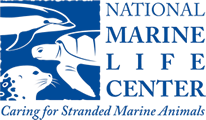Seal Season
The NMLC has just gotten its first seal pup — Belmont. He is every bit as adorable as I imagined, but his arrival makes me wonder about seal births and stranding.

Seals give birth on land, and they will leave the pup on shore when they hunt (despite its being able to swim). It is critical that no one approach the pup during this time for two reasons: the Marine Mammal Protection Act of 1972 makes it illegal to get within 150 feet of a seal, and the mother may abandon her pup if it is surrounded by people.

Despite their irresistible cuteness, seals are still wild animals. They can bite and cause some real damage. Human presence is really stressful for them. Seals show stress through shivering, yawning, vocalizing, or breathing heavily. Some people may try to put a blanket on a shivering seal, but this will only increase their stress. Furthermore, please do not feed seals. They do not eat on land, and they definitely shouldn’t eat human food.
In summary, when you find a seal:
- Do not approach it. If you can, try to prevent others from approaching it.
- Call 508-743-9548, the IFAW stranding hotline, if you are local to Cape Cod or Southeastern Massachusetts. Otherwise, click here for other numbers to call.
- Observe the seal from a safe distance until trained personnel arrive. They will conduct a health assessment and decide where to go from there.
